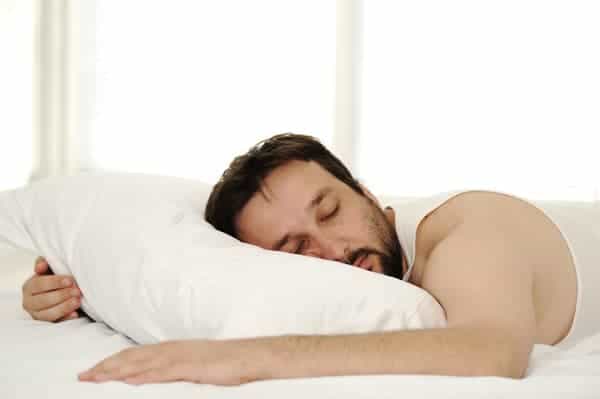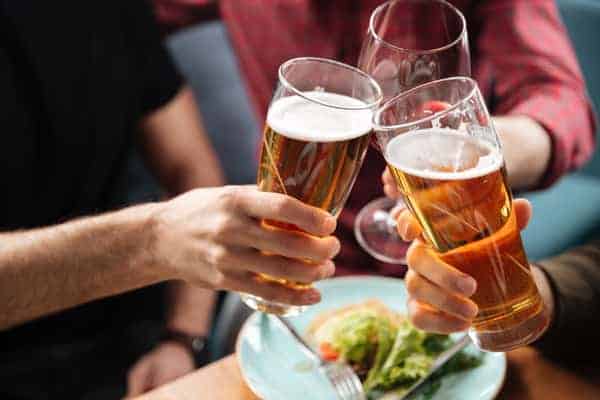Junk food often means different things to different people. However, most of us can agree that an “unhealthy food”, high in sugar, salt or fat, with little nutritional value is considered junk food.
But, why does eating junk food make me feel sick?
Junk food typically contains large amounts of sugar, or refined carbohydrates, and when eaten cause a spike in blood sugar. The spike in blood sugar is then followed by a blood sugar crash which can cause you to feel sick. Symptoms include fatigue, anxiety, irritability, sweating, etc.
The correlation between simple carbohydrates and blood sugar, and between blood sugar and feeling ill, are pretty clear. Fatigue, in particular, is a very common symptom.
There’s a long list of other symptoms and issues that come from eating junk food too, some of which can have lifelong consequences.
It’s best to eat junk food in moderation to avoid these issues. That said, if you do eat junk food and feel sick there are some things you can do. I’ve included 5 tips to help you feel better after eating junk food, below.
Keep reading…
Junk food and why it makes you feel sick (simple breakdown)
To better understand why junk food may be making you feel sick, it’s important to understand how our bodies utilize carbohydrates to provide energy to our brain, muscles, and the rest of our body.
Carbohydrates, blood sugar, and its effect on our body
When we consume carbohydrates our body breaks down the digestible carbs into sugar, that sugar then enters the blood stream. This causes blood sugar levels to increase.
When blood sugar levels increase it triggers our pancreas to create insulin. Insulin is what tells our cells to utilize that blood sugar for energy and storage.
When our cells start using the sugar in our blood, our blood sugar levels drop. The drop in blood sugar signals the pancreas to begin making glucagon. Glucagon is the hormone that tells our liver to start releasing stored/unused sugar.
This relationship between insulin and glucagon is what ensures our body has a constant and balanced supply of blood sugar (i.e. energy).
Now that you have an understanding of how our body uses carbohydrates, it’s important to understand how the type of carbohydrates we eat can positively or negatively impact our body.
Different type of carbohydrates (and which ones to avoid)
All carbohydrates are not created equal! There are different kinds of carbohydrates (simple and complex). The type of carbs you’re consuming will have a big impact on how those carbs are utilized by the body.
The main difference between the two are how quickly our body digests them. One is much more likely to make you feel sick.
Simple carbohydrates:
Simple carbohydrates are carbohydrates with a very basic molecular structure. They consist of either a single monosaccharide (class of sugar) or two monosaccharides linked together (a disaccharide).
Simple carbs are digested and utilized by the body quickly. Due to how quickly they’re digested, spikes in blood sugar are very common.
As mentioned previously, spikes in blood sugar lead to severe blood sugar crashes and can leave you feeling fatigued and irritable. This is likely what you’re experiencing after eating junk food.
Additionally, any sugar/carbohydrate that isn’t used right away is converted to fat. This is why eating foods high in sugar can lead to weight gain.
Some examples of simple carbohydrates are:
- Baked goods made from white flour
- Candy
- Fruit juice
- Packaged cereals
- Table sugar
- Corn Syrup
A healthier alternative is complex carbohydrates.
Complex carbohydrates:
Similar to simple carbs, when complex carbs are digested they’re broken down and converted into glucose to be used for energy.
However, complex carbohydrates are more difficult (or complex) for the body to breakdown, therefore they provide longer, more stable energy than its simple carbohydrate counterpart.
Complex carbs usually provide other benefits in addition to the speed at which they’re digested, too. Things like vitamins, minerals and fiber are often found in complex carbs.
Fiber, specifically, is an important carbohydrate for our digestive system.
While complex carbohydrates are typically better for you than simple carbs, it’s still important to review the overall nutritional profile when determining whether or not to include it in your diet.
Some examples of complex carbohydrates are:
- Whole wheat bread
- Brown rice
- Barley
- Quinoa
- Legumes (black beans, lentils, etc.)
- Starchy vegetables
Regardless of the type of carbohydrates you’re eating, it’s important to make sure your diet is well-balanced. Over consumption of either type can still leave you feeling sick.
How to feel better after eating junk food
If you find yourself feeling sick after eating junk food there are a variety of things you can do to feel better. Here are 5 tips on how to feel better after eating junk food.
1. Drink plenty water

One of the best ways to make yourself feel better after binging on some junk food is by hydrating.
Water is undeniably the most important nutrient. It’s also the only nutrient that will kill you if deprived of it for more than a few days.
While there is insufficient data on exactly how much water we need on a daily basis, it’s clear that for both short and long-term health and performance regular hydration is necessary.
In regards to high levels of glucose (sugar) in the bloodstream, water intake is especially important. Lack of water intake has actually been shown to be associated with developing hyperglycemia.
Stop feeling sick and drink some water!
2. Get lots of sleep

Sleep is another great remedy when feeling sick after eating a bunch of junk food. There are so many correlations between sleep and overall health.
Getting a good night’s rest has been shown to be associated with weight loss, reduced stress and cortisol levels, and improved overall health.
In regards to feeling sick from junk food, quality sleep gives your body the proper time it needs to rid itself of any harmful toxins.
Conversely, consuming high amounts of simple carbohydrates (high glycemic-index carbs) has been shown to adversely effect the quality of sleep we get at night.
So, put the Doritos down and climb into bed!
3. Exercise

There are so many benefits from exercise! Improved blood circulation, stress reduction, better sleep… the list goes on. Exercise is especially beneficial when it comes to our body’s ability to digest food.
Additionally, when we exercise it helps circulate nutrients and oxygen to the muscles and tissues throughout our body.
A quick HIIT workout, or even a 30 minute walk, is a great way to work off some of that junk food, keep yourself from feeling lethargic, and avoid feeling sick.
Get after it!
4. Avoid Alcohol

Alcohol is essentially a poison.
When we drink alcohol, especially in excess, our body will metabolize it before utilizing other sources of energy. So, instead of processing all of the junk food we ate, our bodies will be working on the alcohol we drank.
This is counter productive to making yourself feel better…
The first step to feeling better after binging on some junk food is to allow our body to process that food, to digest it.
Not saying you should never drink alcohol again, but its usually best to avoid it if you’re feeling sick after eating junk food. Your body will thank you!
5. Be kind to yourself
The last tip I have for helping you feel better after eating junk food is to be kind to yourself. It may sound odd, but it’s honestly a really important thing to remember when it comes to the longevity and sustainability of any diet.
It’s really easy to be hard on yourself after breaking your diet or binging on some not-so-healthy foods. And, sometimes that can lead to more poor choices or even completely derailing your diet.
If you feel bad, or sick, after eating junk food, start by taking the necessary steps to feel better. Drink plenty water, get some rest, exercise, etc., etc. But, don’t beat yourself up, it’s absolutely okay!
One bad meal, or even a few bad meals, isn’t going to ruin your progress. What will ruin your progress, though, is thinking you can’t get yourself back on track.
